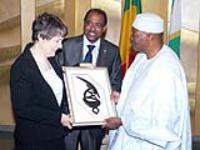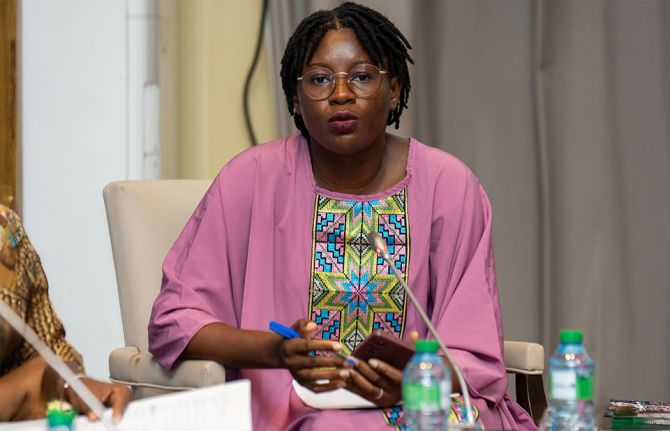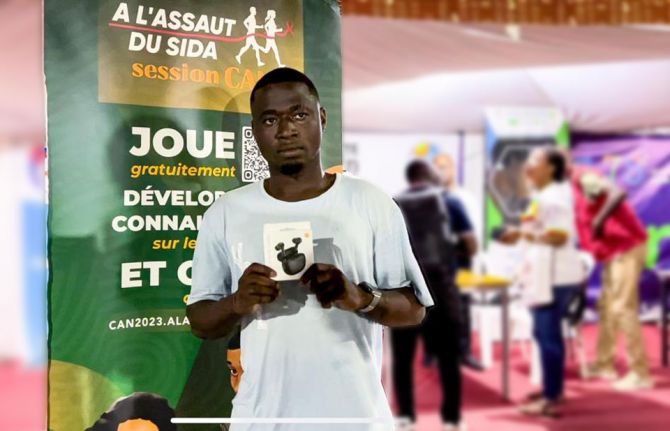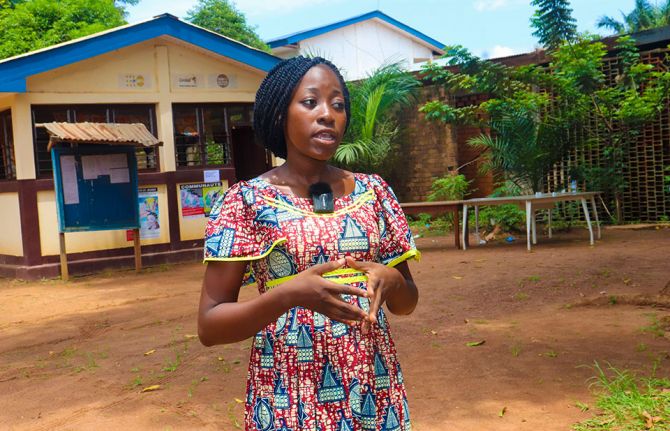
Feature Story
Joint Mission to Mali Concludes
06 mai 2010
06 mai 2010 06 mai 2010 (L to R) UNDP Administrator Helen Clark, UNAIDS Executive Director Michel Sidibé, President of Mali Amadou Toumani Touré. 4 May 2010. Credit: UNDP
(L to R) UNDP Administrator Helen Clark, UNAIDS Executive Director Michel Sidibé, President of Mali Amadou Toumani Touré. 4 May 2010. Credit: UNDPOn the fourth and final day of their official visit to Mali, UNDP Administrator Helen Clark and UNAIDS Executive Director Michel Sidibé commended President Amadou Toumani Touré on achievements in the country’s AIDS response and said that Mali had set an example for other countries in the region to follow.
According to government estimates, about 27 000 people were receiving antiretroviral treatment in 2009, representing more than 80% of those in need. HIV prevalence in Mali declined from about 1.7% in 2001 to 1.3 % in 2006.
“I want to congratulate President Touré for leading Mali's success in the national AIDS response," said Ms Clark, in a meeting with the Malian Head of State. "These results are remarkable.”
Mr Touré, who has served as President since 2002, is Chair of Mali’s National AIDS Committee, an organization that coordinates the country’s AIDS programme. He said the Committee had succeeded in uniting all sectors in the country, including all levels of government and civil society. However, he underscored the importance of remaining vigilant in the national HIV response: “AIDS is like a boxing match. We can never let down our guard,” he said.
Mali needs to build on its success by redoubling efforts to ensure an HIV-free generation.
UNAIDS Executive Director Michel Sidibé
During the visit, Mr Sidibé reiterated his call for the elimination of mother-to-child transmission of HIV: “Mali needs to build on its success by redoubling efforts to ensure an HIV-free generation.” An estimated 12% of pregnant women in Mali received an HIV test in 2008 and, that same year, only 18% of infants born to HIV-positive women were given ARV prophylaxis to prevent mother-to-child transmission.
Ms Clark and Mr Sidibé began their mission in the ancient city of Timbuktu, where they visited Groupe d'Appui à la Formation de Base (GAFB), a local civil society organization that provides HIV prevention through innovative peer education programmes among vulnerable populations, including uniformed services, youth, and domestic workers.
“Twenty years ago when I was Minister of Health in my own county, we had the same chance that you have today in this region to stop the epidemic in its tracks,” said Ms Clark, a native of New Zealand. “We were successful because we had a very inclusive approach. Mali should be the example for other countries in Africa on how to halt the HIV epidemic."
GAFB is working to give people a voice and help the most marginalized members of society, said Mr Sidibé. "This organization is showing that we can end the HIV epidemic by focusing on those that are most vulnerable," he added.
GAFB started its activities with the support of a World Bank grant, and continues to expand its services through resources from the Global Fund. In January 2010, the Global Fund awarded Mali a two-year grant of US $43 million to intensify HIV prevention, treatment, care and support across the country.
Joint Mission to Mali Concludes
Cosponsors:
Multimedia:
Feature stories:
UNDP and UNAIDS joint mission to Mali continues (03 May 2010)
First joint mission by UNDP and UNAIDS to Mali (01 May 2010)
Related
 Empowering youth to lead Togo’s HIV response
Empowering youth to lead Togo’s HIV response

31 octobre 2024
 Interactive health and HIV game app reaches more than 300 000 young people in Côte d’Ivoire
Interactive health and HIV game app reaches more than 300 000 young people in Côte d’Ivoire

09 septembre 2024
 Bridging gaps: sex education saves lives in Central African Republic
Bridging gaps: sex education saves lives in Central African Republic

03 septembre 2024
